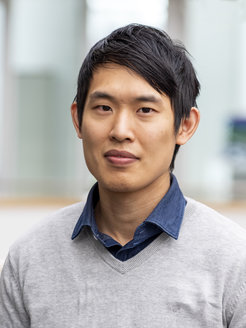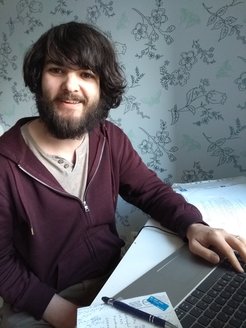Two new Humboldt fellows at the MPSD
Two young researchers, Albert Liu and Alan Lewis, have been awarded Humboldt Fellowships to pursue their work at the MPSD. Albert Liu is based in Andrea Cavalleri's group in the Condensed Matter Dynamics Department and Alan Lewis works in Mariana Rossi’s independent Lise Meitner research group, Simulations from ab Initio Approaches.

Albert Liu came to the Institute after finishing his PhD at the University of Michigan in the USA where he worked on applying multi-dimensional spectroscopic techniques to colloidal nanocrystals. His Humboldt project will focus on extending multi-dimensional spectroscopies to the terahertz frequency range, which has remained largely unexplored.
The project benefits from the unique research environment in the Cavalleri group, and the MPSD more broadly, says Albert: “The close collaboration between theoretical and experimental groups enable ambitious research projects that are not possible elsewhere.
"This work will build on my expertise in multi-dimensional spectroscopies and the Cavalleri group's expertise in strong-field terahertz spectroscopies to develop novel probes of quantum matter. This will provide unique insights into both their equilibrium and light-induced phases while simultaneously pushing the technological limits of ultrafast spectroscopies.”
Alan Lewis is equally thrilled to be awarded the Fellowship. He completed his PhD at the University of Oxford and joined the MPSD after spending two years as a postdoctoral researcher with Tim Berkelbach at the University of Chicago.

In Mariana Rossi's group, Alan will develop ab initio methods which simulate non-linear spectroscopy at water-solid interfaces and looks forward to the opportunities provided by extending his stay at the MPSD.
“These interfaces are important in a wide variety of applications,” he says. “We will particularly focus on systems which play a key role in the generation of hydrogen by water electrolysis, which is an increasingly widespread method of storing energy. This will allow me to build on my previous experience with non-linear spectroscopy, while developing new skills in ab initio molecular dynamics simulations.”
The Alexander von Humboldt Foundation awards its prestigious research fellowships to promising young scientists with above average qualifications in their early career. The fellowships allow international scientists to carry out long-term research projects in Germany. Applicants are free to choose their research topic and their academic host.

